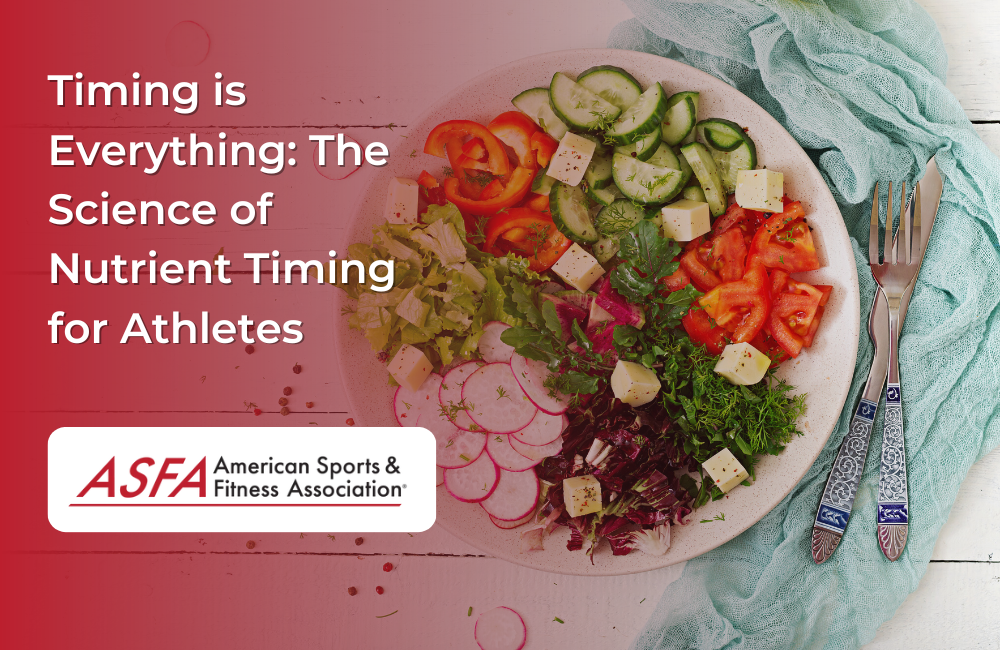Nutrition is a critical component of athletic performance, and the timing of nutrient intake can make a significant difference in an athlete's ability to perform, recover, and achieve their goals. Nutrient timing is a science that involves strategically planning when and what to eat before, during, and after exercise to optimize performance and recovery. In this blog, we will explore the key principles of nutrient timing for athletes and how it can positively impact training and competition outcomes.
The Science Behind Nutrient Timing
The concept of nutrient timing revolves around the idea that the body's nutritional needs vary depending on the time of day and the type of physical activity. Proper nutrient timing aims to:
- Maximize Energy Levels: Fueling before exercise ensures that the body has enough energy to perform optimally.
- Enhance Performance: Consuming the right nutrients during exercise can sustain endurance and intensity.
- Accelerate Recovery: Post-exercise nutrition aids muscle repair, glycogen replenishment, and overall recovery.
Key Components of Nutrient Timing
1. Pre-Exercise Nutrition:
Nutrition before exercise is essential to provide the body with the energy it needs to perform at its best. Key considerations include:
- Carbohydrates: Consume complex carbohydrates 2-3 hours before exercise to top off glycogen stores and provide sustained energy.
- Protein: Include a small amount of protein to support muscle repair and reduce muscle damage.
- Hydration: Begin exercise well-hydrated by drinking fluids leading up to your workout.
2. During Exercise Nutrition:
For prolonged or high-intensity exercise, maintaining energy levels is critical. During exercise, focus on:
- Carbohydrates: Consume easily digestible carbohydrates in the form of gels, chews, or sports drinks to sustain energy levels.
- Hydration: Regularly drink fluids to prevent dehydration, especially in hot or humid conditions.
3. Post-Exercise Nutrition:
The post-exercise recovery window is a crucial period for muscle repair and glycogen replenishment. Key post-exercise considerations include:
- Carbohydrates: Consume carbohydrates immediately after exercise to replenish glycogen stores.
- Protein: Include a source of protein to support muscle repair and growth.
- Fluids and Electrolytes: Rehydrate with fluids containing electrolytes to replace what was lost through sweat.
4. Bedtime Snack:
For athletes training intensely or multiple times a day, a small bedtime snack that includes protein can support muscle repair during sleep.
Individualized Nutrient Timing
It's important to note that nutrient timing is not a one-size-fits-all approach. Individual factors such as the type of sport, training intensity, body composition goals, and personal preferences influence nutrient timing strategies. Athletes should customize their nutrient timing plan based on their unique needs and goals.
Practical Tips for Nutrient Timing
Here are some practical tips for implementing effective nutrient timing strategies:
- Plan Ahead: Plan your pre-exercise and post-exercise meals and snacks in advance to ensure you have the right nutrients readily available.
- Experiment: Pay attention to how your body responds to different nutrient timing strategies and adjust as needed.
- Stay Hydrated: Proper hydration is a crucial component of nutrient timing. Monitor your fluid intake throughout the day.
- Include Variety: Consume a variety of carbohydrate sources (e.g., whole grains, fruits, vegetables) and protein sources (e.g., lean meats, dairy, plant-based options) to meet your nutritional needs.
Consult a Sports Dietitian
For athletes with specific dietary needs, performance goals, or complex training schedules, consulting a registered dietitian or sports nutritionist is highly beneficial. They can provide personalized guidance and meal plans tailored to your training regimen and objectives.
Conclusion
Nutrient timing is a science that can significantly impact an athlete's performance, recovery, and overall training outcomes. By strategically planning when and what to eat before, during, and after exercise, athletes can maximize their energy levels, enhance performance, and accelerate recovery. Remember that nutrient timing should be individualized to align with your unique training and performance goals. Timing is indeed everything when it comes to achieving peak athletic performance.





